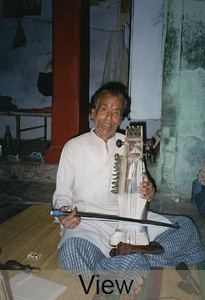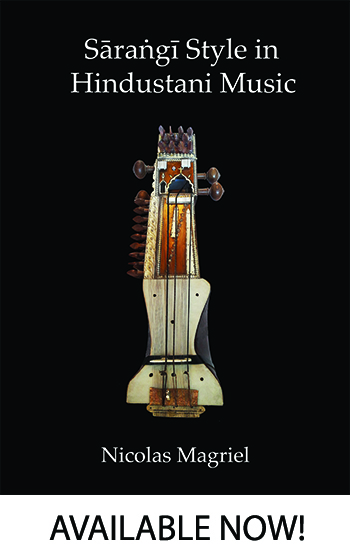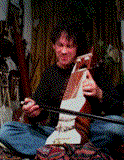
I visited Bholanath Mishra, a warm and cheerful sarangi player, several times at his quarters in Lucknow in April 1994. He was, at the time, the most interesting sarangi player in Lucknow from a combined musical and humanistic perspective. He played and sang several rags and talked extensively about music and life. He had an profound knowledge of thumri, dadra, kajri, chaiti, the semi-classical song forms of purab ang music, and a highly developed propensity to savour the notes and phrases which he played. He taught me several songs in the course of my stay in Lucknow. He was able and more than willing to sit and play and sing for hours on end, drinking up my appreciation and comradie.
Bholanath Mishra learnt from his grandfather Sathyanarayan Mishra as his father passed away when he was a toddler. Sathyanarayan Mishra was an outstanding Banaras sarangi player.
On April 13, 1997, Bholanathji started off by playing khayal for me, several rags, until he realised that I particularly wanted to hear his semi-classical repertoire, over which he nearly exploded with enthusiasm. Throughout our sittings together he freaquently sang the bandishes which he was playing showing great proficiency and aesthetic mastery, often also singing heart-melting bil banao with thumris and horis. . At the beginning, my reprehensible tabla playing can be heard in accompaniment.
The first piece was rag Jaunpuri:
Followed by rag Todi including vocal renditions of the famous bandishes "Allah Jane" and "Langara Kankariya Jina Maro":
Then Bholanath Mishra played the afternoon rag Multani and sang a couple of bandishes in Multani.
And then rag Rageshri and some nice bandishes sung including a lakshan geet, a type of song which describes the rag at hand. As Bholanath was an accompanist at the Bhatkhande College of Music, and as Pandit Bhatkhande wrote many lakshan geets, I would guess that he was the source. I have rarely heard lakshan geets from other sarangi players. Rageshri is followed by plenty of discourse on a variety of subjects.
May 2024: I am now finally uploading some more gems of Bholanathji from April 13th, 1997 Firstly some discussion:
And then a sweet thumri in Khamaj:
Next a beautiful chaiti, a song of Springtime.
And now a gaatho:
And an exhilarating tappa in Khamaj:
And another tappa in Yaman:
Than a dadra and a tappa, both in Bhairavi:
Then a sargam composition in Bhairavi:
And another Bhairavi dadra:
Finally a bandish ki thumri in Kafi played and sung:
And now the afternoon rag Patdeep, a return to khayal, followed by more discussion:
In the next series Bholanathji plays my sarangi at the Bhatkhande music college where he was employed, two days later, April 15th, 1997. First a lovely bol banav hori in Mishra Kafi, played and sung:
Then a demonstration of paltas loosely cttached to the hori ke had been playing, and then various other hori compositions:
Then a chaiti and a gatto (still at the college with several sarangi players hanging out and enjoying):
My next visit was on April 17th (erroneously labelled "April 14th" on some of the video title pages). My then-partner Lalita came along and impressed with her immaculate Hindi and enthusiam for song texts, the subject of her PhD thesis, later published as the book The Lyrics of Thumri. Bholanathji excitedly explained the lyrics of the songs covered in the session. He started by playing khayal in rag Yaman. Starting with khayal ("serious" classical music, as he had done the first day I met him) is typical of sarangi players and baijis aspiring to demonstrate their classical pedigree. Rag Yaman:
The next video includes demonstrations of two Yaman khayal bandishes followed by taranas in Rageshri and Malgunji:
Then two more taranas, in Jaunpuri and then Bhopali.
Soon Lalita had impressed Bholanathji with her fluency in coloquial Hindi and appreciation of thumri and related genres. The next video displays two sweet bhajans:
Next Bholanathji explored a beautiful chaiti:
Then a hori and a daf hori, both in Mishra Kafi:
And finally a bol banao thumri in Mishra Khamaj:
It was sad saying goodbye to Bholanathji and his mother and wife who had been sitting with us throughout the afternoon. I deeply regret never seeing this wonderful man and musician again. I don't know if he is still alive (2024). I wrote to the Bhatkhande music college, but they have not responded. However I did come across an article in the Times of India that says that the college has been blamed for mistreatment that caused the death of another sarangi player whom I worked with at that time, Vinod Kumar Mishra, who passed away tragically in 2021, not long after his brother Santosh.



